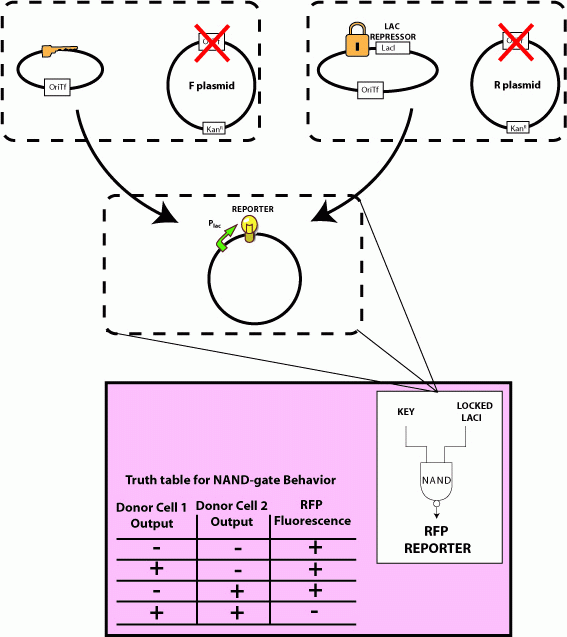Berkeley2006-NandMain
From 2006.igem.org
(Difference between revisions)
JCAnderson (Talk | contribs) |
JCAnderson (Talk | contribs) |
||
| Line 1: | Line 1: | ||
| - | + | '''One application of addressable conjugation is computation. Here, individual cells of a culture are the switches, and triplets of cells perform binary logic. Because connected NAND logic gates can perform any computation tasks, we have initiated their construction.''' | |
[[Image:Berkeley2006_NAND1.GIF]] | [[Image:Berkeley2006_NAND1.GIF]] | ||
| + | |||
| + | In this design, riboregulators are the inputs that control the transfer of a different riboregulator outputs. Only when both riboreegulator inputs are received is a lacI gene expressed. The LacI product then represses the activation of the sending system. | ||
---- | ---- | ||
Next Section: [[Berkeley2006-NetworksMain | Trained Learning in a Bacterial Network]] | Next Section: [[Berkeley2006-NetworksMain | Trained Learning in a Bacterial Network]] | ||
Revision as of 03:46, 29 October 2006
One application of addressable conjugation is computation. Here, individual cells of a culture are the switches, and triplets of cells perform binary logic. Because connected NAND logic gates can perform any computation tasks, we have initiated their construction.
In this design, riboregulators are the inputs that control the transfer of a different riboregulator outputs. Only when both riboreegulator inputs are received is a lacI gene expressed. The LacI product then represses the activation of the sending system.
Next Section: Trained Learning in a Bacterial Network
